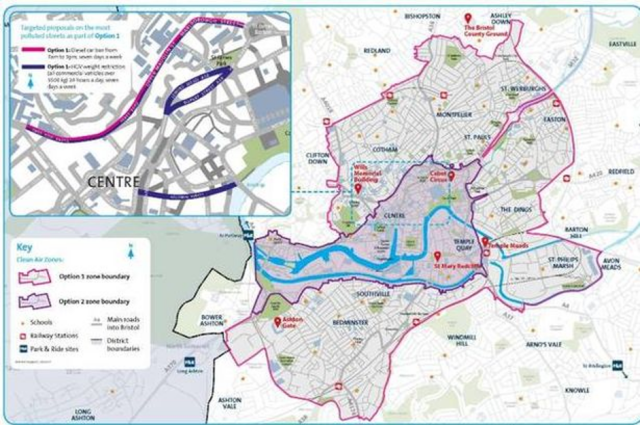
Since the ‘Dieselgate’ emissions scandal of 2015 diesel vehicles have been increasingly demonised on UK roads. Sales of new diesel cars have slumped, even though vehicles that meet the latest Euro 6 standards are much cleaner than earlier models and cleaner than some petrol cars.
Fast forward to November 2019, Bristol City Council announced that it was to become the first city in the UK to ban diesel cars from its streets completely and charge other diesel vehicles to enter the city. The Bristol scheme is aimed at reducing the city’s nitrogen dioxide levels which currently exceed legal limits.
Bristol’s move is one of many being mooted around the country but if you live in the city or visit it regularly, what will it mean for you?
Bristol’s Two Stage Plan
The first thing to note is that the plan comes in two stages. The plans submitted to the Government are for an inner city diesel car ban along with a larger Clean Air Zone (CAZ). Both of these are subject to public consultation and Government approval which means that things could change before the scheme is implemented – currently scheduled for 2021.
There’s a map on the Clean Air for Bristol site showing the initial zones covered by the proposals. The inner city area covers 1.26 square miles of the city centre and a ban on all privately owned diesel cars in this area would apply between 7am and 3pm each day, seven days a week. There will be no restrictions outside of these hours. The ban would apply to all diesel cars, regardless as to whether they meet the latest emissions standards. Owners of vehicles breaching the ban would be subject to a fine, although the amounts involved are not yet known.
The wider CAZ covers an area of 5.61 square miles. In this zone vehicles not meeting the Euro 6 standard for diesels or the Euro 4 standard for petrol engines will be subject to a daily charge. For taxis and light vans, this is set to be £9 per day, going up to £100 per day for buses and HGVs.
Commercial vehicles that have paid the CAZ charge – and newer, cleaner ones that don’t need to – will be allowed to drive through diesel ban zone.
There are likely to be exemptions for some vehicles. Blue badge holders who live within the zone may be exempt, for example, as may be low income families whose only transport is a diesel car. There could also be exemptions for some classes of vehicle; these may include school buses and coaches, emergency vehicles, NHS patient transport ambulances, community transport vehicles, specialist vehicles such as cranes and agricultural vehicles, historic vehicles, security services, diplomatic vehicles and military vehicles.
Other Proposals
In addition to the imposition of these zones, other proposals include banning HGVs of more than 3.5 tons from some of the busiest streets including Rupert St, Baldwin Street, Park Row/Upper Maudlin Street, Marlborough Street and Lewins Mead.
There will be other changes to traffic management too, including a park and ride and bus lanes on the M32 to cut car journeys into the city. Existing traffic signals will also be re-programmed to hold back traffic entering the city centre.
These proposals are likely to lead to some anomalies. For example, under current plans at the northern end of Greenway Bush Lane in Southville, one side of the street will be subject to the diesel car ban while the other won’t!
In order to help residents and commuters who own diesel cars, a scrappage scheme is being proposed. This would pay people who scrapped their diesel car up to £2,000 to finance a cleaner alternative. This sum could be used to help finance a newer, cleaner vehicle or it could be spent on public transport or even a bike.
The scrappage scheme will extend beyond just Bristol residents. Anyone living in Bristol, Bath and North East Somerset, North Somerset and South Gloucestershire would be eligible to take part in the scrappage scheme if their drive into work includes the charging zone area.
Concerns
There have been some concerns about the wider impact of the scheme, in particular how it will affect access to the Bristol Royal Infirmary and Bristol Royal Children’s Hospital, both of which lie on the boundary of the charging zone. A spokesperson for University Hospitals Bristol NHS Foundation Trust told the BBC that it was in touch with the council with the aim to “ensure there will be no disruption to patient care and the smooth running of the city centre hospitals”.
Further concerns have been raised surrounding the effect of the ban and the CAZ on the city’s tourist industry too. The SS Great Britain Trust is one of the organisations expressing some reservations.
The ban on all diesels regardless as to how old they are has also been criticised as not meeting Government guidelines. Mike Hawes, of motor industry trade body The Society of Motor Manufacturers and Traders (SMMT) says it, “…fails to distinguish between modern vehicles and decades-old technologies and will only cause confusion for drivers while also undermining efforts to boost air quality.”
What Happens Next?
The plans are not going to come into effect before 2021, so there’s no need to panic about how they will affect you just yet. Further discussions and consultations will be taking place between now and then so it’s likely that the proposals will evolve and some of the issues raised will be ironed out.
To keep up to date with the scheme, you can visit the Clean Air for Bristol website which has further detail on how it will work and who will be affected by it.

